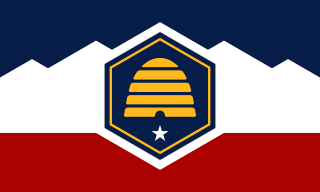
The Beehive Flag is the official flag of the U.S. state of Utah. It is a horizontal tricolor with irregular bands of blue, white, and red. The middle white band contains a blue hexagon outlined in gold. Within the hexagon lies a gold-colored beehive, and below it sits a five-pointed white star.

Curtis Scott Bramble is an American politician and Certified Public Accountant serving as a member of the Utah State Senate, representing the state's 24th senate district. Prior to redistricting he represented the 16th senate district in Provo. On March 18, 2024, he announced that he would retire from the legislature at the end of 2024.

Mark Benson Madsen is an American politician and attorney from Utah. A Libertarian, he is a former member of the Utah State Senate, where he represented the state's 13th senate district in Utah, and Tooele Counties including the city of Lehi. Madsen is the grandson of Ezra Taft Benson, Secretary of Agriculture under President Eisenhower.
Mark Archuleta Wheatley is a Democratic member of the Utah State House of Representatives, representing the 35th District since 2004. He lives in Murray, Utah, with his wife Josie.

Equality Utah is an American non-profit 501(c)(3) organization which is Utah's largest LGBT rights group based in Salt Lake City, Utah. The organization is a member of the Equality Federation.

Mormons Building Bridges is a decentralized grassroots group composed primarily of members of the Church of Jesus Christ of Latter-day Saints who seek to improve the attitudes between members of the LDS Church and the LGBT community.

Sean David Reyes is an American lawyer and politician who has been the Attorney General of Utah since 2013. Appointed to the office by Governor Gary Herbert following the resignation of John Swallow, Reyes was reelected. Reyes is a member of the Republican Party and is a vocal and longtime supporter of Donald Trump. He has served as a county, state, and national delegate for the Republican Party and a member of the Utah Republican Party's State Central Committee.
The Count My Vote initiative was a 2014 Utah citizens' initiative measure which proposed to replace the state's caucus selection process for candidates for public office with a mandatory primary election. The initiative sponsors' stated purposes were to increase civic engagement and voter participation. The text of the Count My Vote initiative was incorporated into Senate Bill 54 by the Utah State Legislature—along with an option for a dual-path nominating process involving conventions and/or petitions—and this bill was signed into law by Governor Gary Herbert in March 2014. The constitutionality of this law was challenged in federal court by the Utah Republican Party and the Utah Constitution Party, which opposed the option of qualifying for a primary by means of gathering signatures.

Cannabis in Utah is illegal for recreational use. Possession of small amounts is punishable as a misdemeanor crime. Medical use was legalized by ballot measure in November 2018, after a CBD-only law was passed in 2014 and a limited "right to try" law was passed in March 2018.

The Adult Use of Marijuana Act (AUMA) was a 2016 voter initiative to legalize cannabis in California. The full name is the Control, Regulate and Tax Adult Use of Marijuana Act. The initiative passed with 57% voter approval and became law on November 9, 2016, leading to recreational cannabis sales in California by January 2018.

Cannabis in Arizona is legal for recreational use. A 2020 initiative to legalize recreational use passed with 60% of the vote. Possession and cultivation of recreational cannabis became legal on November 30, 2020, with the first state-licensed sales occurring on January 22, 2021.

Cannabis in Florida is illegal for recreational use. Possession of up to 20 grams is a misdemeanor offense, punishable by up to a year in jail, a fine of up to $1000, and the suspension of one's driver's license. Several cities and counties have enacted reforms to apply lesser penalties, however.

Cannabis in Michigan is legal for recreational use. A 2018 initiative to legalize recreational use passed with 56% of the vote. State-licensed sales of recreational cannabis began in December 2019.

The 2020 Utah gubernatorial election was held on November 3, 2020, to elect the governor of Utah. Incumbent Republican governor Gary Herbert declined running for re-election to a third full term.
In the Church of Jesus Christ of Latter-day Saints, there is a general prohibition, deriving from the Word of Wisdom, against intoxicating substances; cannabis was explicitly banned by the church in 1915. The church has also sought to influence "appropriate" legal resolutions on medical cannabis.

South Dakota Initiated Measure 26 was a 2020 voter initiative to legalize medical cannabis in the U.S. state of South Dakota. The initiative was certified by the South Dakota Secretary of State for the 2020 ballot on December 19, 2019. The sponsor of the initiative was New Approach South Dakota, a volunteer group headed by Melissa Mentele. The group had unsuccessfully tried to get an initiative on the 2018 ballot. Polling in September 2020 indicated 70% voter support for the initiative.

The 2024 Utah gubernatorial election was held on November 5, 2024, to elect the governor of Utah, concurrently with the 2024 U.S. presidential election, as well as elections to the United States Senate and the United States House of Representatives and various state and local elections. Incumbent Republican governor Spencer Cox won re-election to a second term, defeating Democratic nominee, state Representative Brian King and Republican state Representative Phil Lyman, who ran as a write-in candidate after being defeated in the Republican primary. Primary elections took place on June 25, 2024.

2022 Missouri Constitutional Amendment 3, also known as the Marijuana Legalization Initiative, was a ballot measure to amend the Constitution of Missouri to legalize cannabis at the state level in Missouri. The measure was on the November 7, 2022, general ballot and was approved by voters with a margin of 53–47 percent.
Kirton McConkie is an American law firm headquartered in Salt Lake City, Utah. It is the largest law firm in Utah, and it has long served as the external legal counsel for The Church of Jesus Christ of Latter-day Saints. It was ranked the 300th largest law firm in the United States in 2022 by the National Law Journal.














